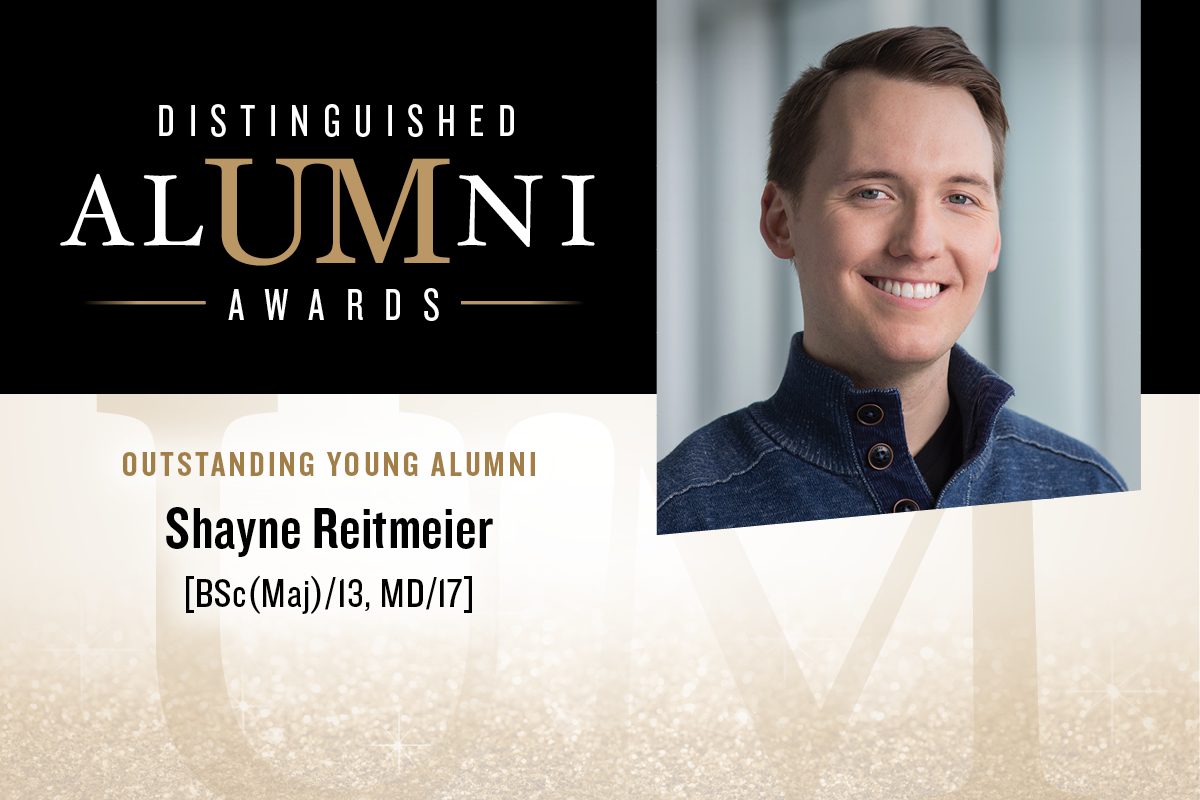
Shayne Reitmeier: 2018 Distinguished Alumni Award Recipient for Outstanding Young Alumni
The recipients of the 2018 University of Manitoba Distinguished Alumni Awards are graduates who are outstanding in their professional and personal lives. These honourees encompass a wide range of achievement, innovation and community service and inspire fellow alumni, current students and the community.
Dr. Shayne Reitmeier [BSc(Maj)/13, MD/17] began changing the face of health care while still in medical school. Balancing academics with advocacy, he created safe spaces for and dispelled myths against LGBTTQI* individuals on campus, while pioneering research into the unique needs and experiences of LGBTTQI* patients and health-care professionals. Today, he is a rural physician in family medicine.
In his own words…
When I was younger, one of the things that helped me relate to others was my imagination. I loved fantasy and could be in my own world for hours. When I played with any sort of toys it meant I could have one heck of a game! The situations would really get out of hand.
Getting into middle school, I really started to struggle with my mental health. I identified as gay and I wish somebody or even myself could have shared those words that I craved to hear so much: “It’s ok to be who you are.”
My favourite undergrad course at the U of M was behaviour modification principles. It’s something I’ve applied to my life over and over and it’s what I talk about with patients who are trying to make meaningful and sustainable change in their lives.
If you have something that’s important in your life you set realistic and practical goals and you prioritize.
One of the things I was hyper-aware of through medical school was: am I losing my empathy? We were told “empathy decreases over time.” You don’t graduate with the same level of empathy as when you started.
I wrote a letter to myself saying “you need to do things to make sure you keep that level of empathy.” I journaled all through medical school. I wanted to remember, vividly, my experiences: the first time I made a medical mistake, the first time I encountered a family with a person who had to be switched to palliative care.
I think my ability to be empathetic is one of the reasons I’m a take action person.
One of my favourite parts of clinic is when I get to see teenagers because I remember where they are in life. There’s so much room for progress. In my teens, I had a mentor that touched my life so I recognize you have a very unique opportunity to make a significant impact in someone’s life even if it’s just a short family medicine visit.
If you want to see me very motivated, find something that somebody needs help with. It fires me up.
Our access to mental health care has a long way to go. When I have people coming in with mental health concerns, I have a very limited amount of resources that I can utilize at this point. It’s very difficult to try and navigate the system.
Prior to starting medicine I was told by somebody I cared about that if I was ever honest about my sexuality I’d never achieve anything in medicine.
I had colleagues in a similar position coming to me with concerns. “Can you be a gay pediatrician working with kids? Don’t people make horrible assumptions about gay men looking at children?” It’s absolutely absurd.
I take concerns from people I care about and try to provide them novel answers. Where else do you get such an opportunity?
I love medicine. I’m very happy and privileged to be where I am.
The U of M is where so much of my transformation occurred. I feel like I owe it to stay and maintain these connections and make progress.
We have a very unique opportunity in Manitoba. Because we don’t have a massive population, we can approach people and actually be heard when we’re trying to facilitate meaningful change.







Dr. Shayne Reitmeier did keep his level of empathy when our mom had to be moved to pallative care just a few weeks ago at Grace Hospital. As we were going through that tough experience, it was comforting to know that he had to make the same decision as we did, as difficult as it was. We didn’t get the chance to thank him and we’re hoping that this message will reach him. Grace Tabios and Pedro Patana